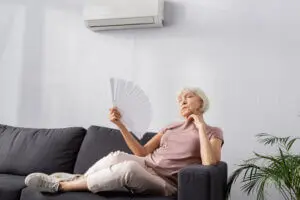
Summer begins next week in the U.S., and many areas are already experiencing heat waves. According to the American Red Cross, excessive heat has caused more deaths than all other weather events in recent years.
Older adults are more vulnerable to dehydration, heat exhaustion and heat Stroke. Please check on them (in person if you live nearby) and review the steps below to keep them safe when temperatures rise. You may think they already know and follow these practices, but you may be as surprised as Gary was.
Gary had lunch with his 83-year-old mother last week. He knew she had become more frail over the past year, but her memory was still sharp. It was a hot day out so when they returned to her apartment after lunch, he turned the air conditioner on to cool off her home.
The a/c unit has an automatic on-off switch, and it shut off in just a few minutes. He pushed the switch so the air conditioner re-started and was blowing cool air. It stopped again very shortly. His mother asked, “Is it normal for it to go off so soon?” Gary agreed it wasn’t and took a closer look at the dials. He realized his mother had it set for the winter, when she didn’t use the air conditioner. She hadn’t yet changed the settings for the warmer summer weather.
Gary said to me, “I never would have dreamed I’d be explaining to my mother how to use her own air conditioner! I guess her memory isn’t as good as I thought it was.”
He took extra time to explain the settings again, and made a mental note to himself to:
Gary now recognizes his mother needs more reminders and closer supervision in her home environment. By seeing her that day for lunch, he likely prevented days of her living in uncomfortable, if not dangerous, temperatures. And she probably wouldn’t have called Gary to ask about the air conditioner not working properly. Per Gary, one of her favorite expressions is, “I didn’t want to bother you, Dear!”
Here are preventive steps to review with older adults to be sure they stay safe and comfortable during the summer heat:
Dehydration can cause dry, sticky mouth, thirst, irritability or confusion, few or no tears when crying, lack of sweating and urination (urine that is produced will be dark yellow or amber), sunken eyes, shriveled and dry skin that lacks elasticity, low blood pressure, rapid heartbeat and breathing, dizziness or lightheadedness, or headaches.
Heat exhaustion symptoms to be aware of include mild nausea, lightheadedness, vomiting, clammy or cold hands, and excessive sweating.
Heat stroke can be deadly and symptoms include fainting, irregular pulse, body temperature above 104 degrees F, hot and dry flushed skin, mental confusion, ill-temperament, or staggering.
Take your Aging parent, relative or neighbor to the nearest hospital emergency room or call 911 immediately if these symptoms appear because they will need medical attention. If in doubt, err on the side of caution!
It is possible to keep older adults safe and healthy this summer by being aware and involved in their lives. Attentive visits will go a long way in preventing heat-related health issues.
Notifications